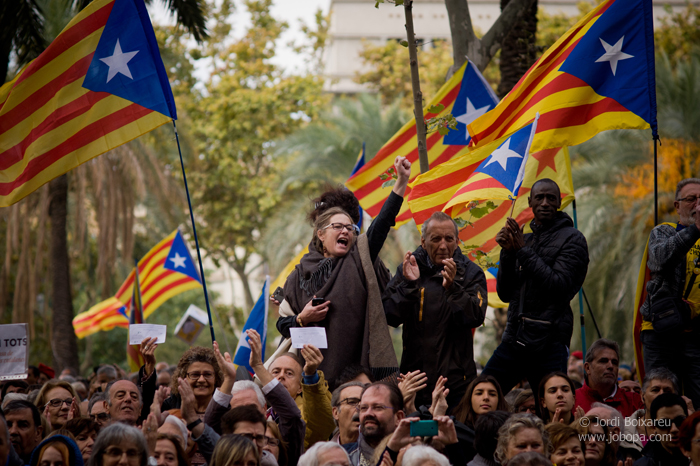Just a few weeks ago, the Catalan pro-independence coalition Junts por Si (Together for Yes, abbreviated as JxSi) argued that the September 27 elections would be “the vote of your life.” Artur Mas, the leader of the party, framed the election as a de facto referendum on independence. A parliamentary majority would result in a unilateral declaration of independence (UDI) for the little region of Catalonia in northeastern Spain, home to around 6 million people. If the election were to serve as a referendum, it failed spectacularly.
The secessionist parties—JxSi and the socialist Popular Unity Candidacy (CUP)—did achieve a parliamentary majority, gaining 72 of the 135 seats; however, they only claimed 48 percent of the vote. The election was far from a decisive victory for the pro-union parties, though, because their vote share was decisively lower. (Several parties favor self-determination without a clear yes or no stance.) The CUP has already stated that they will not support a declaration of independence, nor are they keen to support the Mas government, with whom they have significant ideological disagreements on questions other than Catalan independence.
Given that this “referendum” has given the nationalists power but not a universal mandate, it would seem to follow that they would organize a true referendum—similar to the Scottish referendum—in agreement with the Spanish government. A “yes” majority could give the people an independent Catalan State. The Spanish government, however, has opposed this measure, in fact arguing that an earlier “consultation” (non-binding) independence referendum was illegal under Spanish law. The Catalan Supreme Court, appointed by the Madrid government, decided to wait until two days after the election to indict Mas on charges of abusing his authority, a step that will likely only lead to further raised tensions.
The Spanish government fears what Catalan independence would do to its national identity and economy. The relatively rich Catalan region provides a net gain in taxes to the Madrid government, and its share of the population is significant. Furthermore, Catalan independence could empower nationalists in other parts of Spain, such as the Basque Country or the Canary Islands. This fear has been such a driving force in Spanish policy that Madrid continues to oppose Kosovo’s admission to the EU, afraid that such an act would legitimize its own separatists.
Spanish constitutional law has no provision for independence referenda of any kind, so the Spanish argue that there is no way for Catalonia to become independent without a referendum of all of Spain, which the nationalists would surely lose. (The majority of Spaniards oppose Catalan independence.)
Nonetheless, countless marches and now significant electoral victories show that support for Catalan independence has shot up from around 20 percent just a few years ago to roughly 50 percent—perhaps slightly more, perhaps slightly less. The International Court of Justice found that Kosovo’s declaration of independence without Serbia’s consent was legal under international law, but the extent to which such precedent applies in Catalonia is unclear. Regardless, the spirit of the law is that “all peoples” should have the right to determine their own destiny. The Catalan people, like the Scottish people within the United Kingdom, already have distinct linguistic, cultural, political, and economic institutions and thus can reasonably be called a “people.” The United Kingdom recognized that the Scottish people should be given a right to choose their own destiny. Although these recent elections have failed to conclusively show exactly where the Catalan people stand on the independence question, the Spanish government has ultimately failed to adequately support the Catalan people’s right to self-determination.
Mas faces indictment, no less on the anniversary of the execution of Catalan leader during the Franco era. The Scottish National Party has offered to moderate negotiations between Spain and Catalonia, and the CUP recently proposed that Spanish laws in conflict with Catalan sovereignty be disobeyed, even as they call into question Mas’s significance in the effort. Far from settling Catalonia’s deep political questions, this election appears to have only posed new ones. Only one answer was given, and we knew it already: Has the Spanish government handled this well? No.
Addendum: This article was written before several other key events which followed the Catalan elections. The Parliament of Catalonia has voted to declare independence by 2017, and Artur Mas has not been re-elected president of the Parliament. The chaos has, indeed, only intensified.




